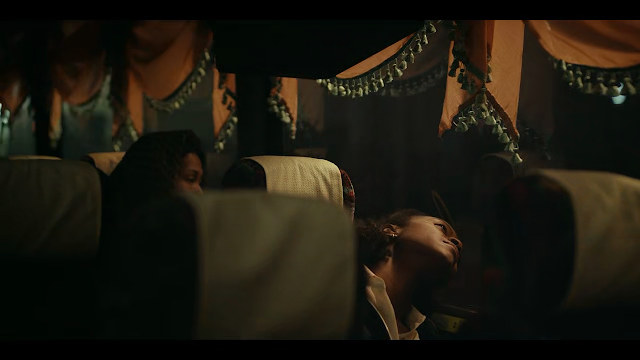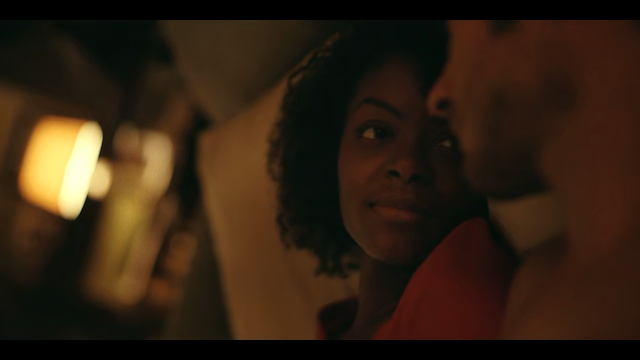Survival is insufficient. I don’t want to live the wrong life and then die.
Station Eleven’s first and third episode could exist entirely by themselves, without the context of a television show. They are insular, self-contained stories that are complete, which creates a kind of alternative universe in which Station Eleven is an anthology show like Black Mirror (this is the first example that comes to mind, mainly because of Mackenzie Davis in the great San Junipero), as if the book it was based on were a collection of short stories. And if that were the case, then Hurricane would be the masterpiece, the stand-out, and in a post-2020 world in which television is making choices about whether or not to adapt the virus into its own history, it is one of most captivating examples of a world in which a virus wreaks havoc.
Hurricane is a love story, told eloquently to the inevitable end, tracing the entire history, from the beginnings – a meet-cute, an actor about to become very famous is fascinated by a woman who is drawing, in a world of her own, and begins a conversation – to the end, when the two of them realise they haven’t quite managed to build a life together, that they will not survive their differences. In a way, the episode is a backstory to Arthur’s ominous explanation about Miranda’s (Danielle Deadwyler is a revelation is the role) finished graphic novel – that this is “the asshole that ruined my life” – which makes it even greater that the seeds of that graphic novel are right there at the table with them when they first meet, that the first time Arthur convinces Miranda that he is worth her time is when he offers an astute interpretation of a work that she has only just begun, only to then be given the drawing of a banana in jest, because nobody is allowed to see her great work before it is finished. Miranda follows Arthur into a bar, for his friend Clark’s birthday party – Clark later says that he has often done this before, kept the company of women that Arthur acquired a few bars previously, and she responds (so self-assured, so self-contained), that perhaps she is the one who acquired him – which is of course exactly what has happened.
It isn’t just small moments of discord, it’s a great question of whether they are suited for each other – if Miranda can stand the shallowness and superficiality of Hollywood (early into it, Elizabeth, who will eventually become Arthur’s second wife, attempts to reassure her at a premiere that she and Arthur are not having an affair, only to be shut down by Miranda’s “I’m dealing with a supply chain crisis here”), if Arthur can accept that Miranda refuses to share her great work with him, that she spends hours and hours drawing in their pool house, by herself, and then she doesn’t even see publication as the goal here – it’s art for art’s sake, for self-expression, to find meaning, not intended for an audience. Because this is such a great love story, it is predictable that Arthur would so precisely find the worst way to hurt Miranda – not just by cheating on her with Elizabeth, but by allowing Elizabeth entrance into the pool house, allowing her to see her work, violating her privacy. It all comes out at a dreadful dinner party through which Miranda and Clark suffer greatly, where two of the guests are insufferably vapid and derail any kind of serious conversation when it threatens to occur (Praha, one of the women breathes dramatically). Maybe it would be easier for Miranda if Elizabeth were as vapid as their other guests, but she isn’t – instead she is genuinely admiring of Miranda’s work, and articulate about its value and meaning, which makes the betrayal even greater. Miranda leaves and burns the pool house containing the first version of Station Eleven to the ground.
And maybe it’s Leon who lends the theme of the episode when he explains logistics to Miranda: it’s about taking the right path between two points, and that isn’t always necessarily the shortest route. Miranda finished Station Eleven from the literal ashes of her marriage, and delivered it to Arthur (who gave it to Kirsten). She was then sent to Malaysia by Leon, to pitch a Chinese company, but once she arrives at the hotel, she soon realises that things are getting strange. People are hurrying, leaving, wearing masks. Their pitch meeting is cancelled. She eventually receives an ominous phone call from Leon, who tells her that the world is ending, that the internet is censored and isn’t telling the truth, that she has to make her way to the docks to go to a freighter, where she will wait out the plague on the open sea, for at least a year. She has a moment of deep, profound shock, maybe because this lines up with Station Eleven, and Arthur’s interpretation of Dr Eleven as “not lonely, but adrift”. I think that instinctually, Miranda is a lone wolf, but then, situations and people come along that move her to make a connection, which is why she doesn’t entirely follow Leon’s instructions and lets her colleague know about what is happening. He doesn’t believe her in any case, and goes to play a round of golf (later he says, “I went golfing because I thought that’s what a person should do”). The plan goes awry, and Miranda returns to the hotel, and eventually does give her pitch - except at this point, she has received Clark’s phone call, she knows that Arthur has died.
Miranda: It’s a good reminder that nothing we have done, or do, matters at all. But it does. It does. The man I loved died last night and… the man I died last night and I went to work. The man I loved died last night and I went to work instead. And I’m here without and you and you and… why wasn’t I with my love when he died?
It is a compelling monologue about catastrophe, about the absurdity of the situation – the world is ending and yet here they are, in a conference room, pretending to care about logistics. At what point during a global pandemic does the pretence of normalcy end, when can you stop, and admit how much of daily life is bullshit, dead weight, window dressing?
Miranda goes to her hotel room with her complimentary room sealing kit, and closes off the air vents, the windows, the doors, to await the inevitable. Dr Eleven knocks on the door, Miranda and the room reflected in his visor.
Random notes:
This episode was written by the great Shannon Houston.
Every scene of this episode is perfect. Has anyone ever seen a job interview as compelling as the one between Leon, a man who is truly passionate about logistics, and Miranda?
We find out in this episode that a second edition of Station Eleven went to Arthur’s son with Elizabeth – a hint as to how lines from the book ended up in the prophecy the stranger from last episode talked about.
Kirsten tattoo's are the same "cut and run" symbol that Miranda was drawing on the napkin.
What an enormously brilliant decision to cast Veep’s freakishly tall Timothy Simons here, and to saddle him with a golf bag for most of the episode to boot. The awkward, absurd beginnings of the apocalypse.
That fucking room sealing set reminded me of those little gift packs of hand sanitiser and face masks that are just a part of life now apparently – the absurdity of having a global catastrophe repackaged as a little amenity by a global hotel chain.




No comments:
Post a Comment